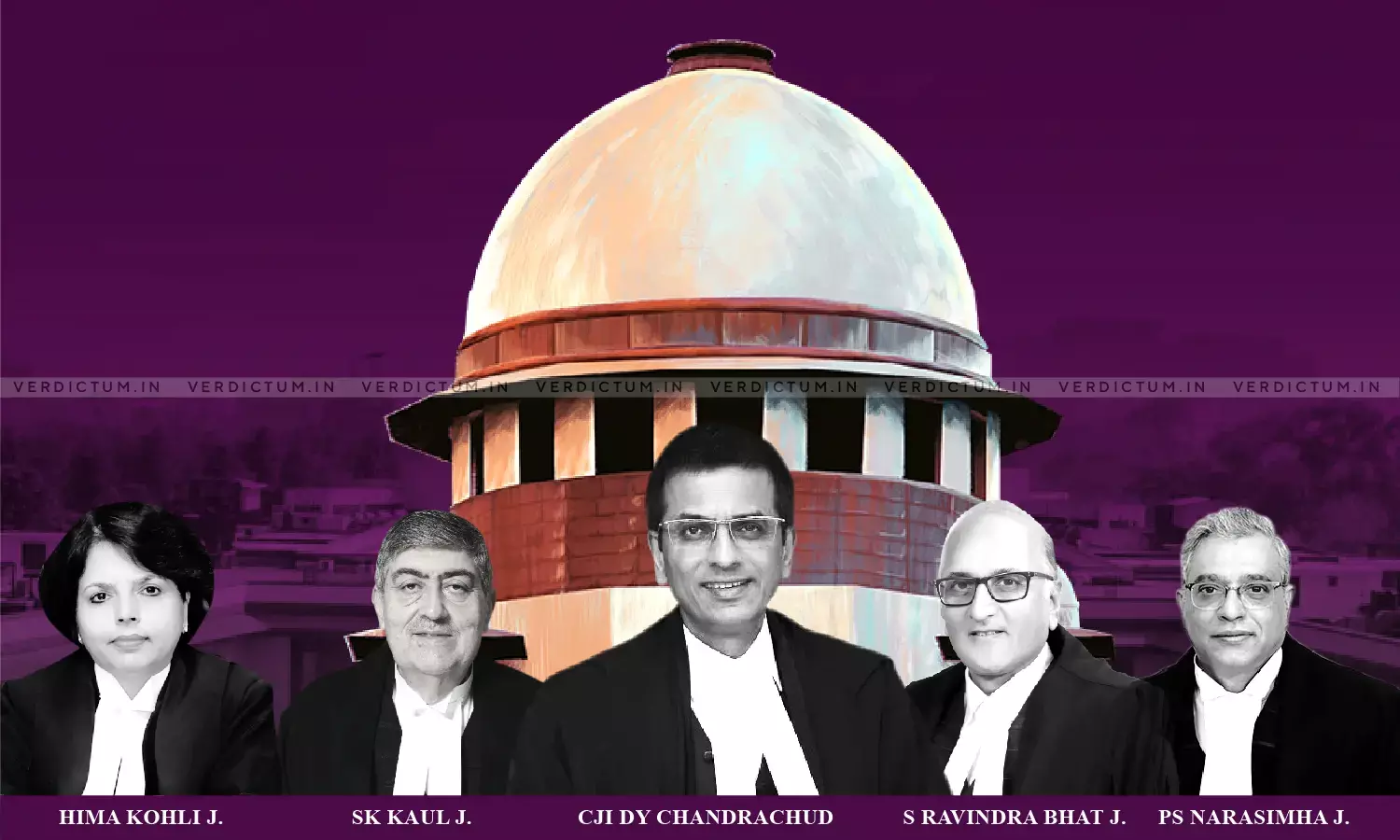Same-Sex Marriage| Constitution Bench Refuses To Consider Center's Preliminary Objection To Maintainability First

The Constitution Bench of the Supreme Court has refused to accept the Center's plea to hear its preliminary objections to the maintainability of the petitions seeking recognition of same-sex marriage first, before hearing the cases on merit.
The Constitution Bench comprising Chief Justice DY Chandrachud, Justice SK Kaul, Justice S Ravindra Bhat, Justice Hima Kohli and Justice PS Narasimha said that it will consider whether to hear the preliminary objections after the petitioners open their arguments in the case.
"My preliminary objections are not my objections on the merits. If merits were to be gone into there are a separate set of arguments. These are only for deciding which forum would adjudicate upon and which forum would be suitable forum and constitutionally the only permissible forum where this debate can take place. So by the very nature of the objection, it must, in my respectful submission, be heard first. While arguing my preliminary objections, I will not raise any submissions on the merits of the case. I am, my lord, very very clear about it", Solicitor General Tushar Mehta submitted at the outset.
"Mr. Solicitor, we will reserve whether to hear you on the preliminary objection at this stage after they have opened up just for about 15 or 20 minutes", CJI Chandrachud responded.
"Then your lordship may do one thing, that is the other request. Let them give their submissions they want, confined to what my preliminary objection is", Tushar Mehta submitted.
"Certainly not. We will not do anything of that sort", the CJI responded. "I am sorry Mr. Solicitor, we are in charge. Mr. Solicitor, we will hear you later", CJI said.
"Lorshop may give me a minute", the SG said.
"Leave it to us, how we conduct our proceedings. I will not allow this in my Court", Chief Justice Chandrachud said.
"This is a matter, too sensitive an issue, where your lordship would examine the preliminary submissions and then give me some time. We may have to consider what would be the stand of the government in further participation in this debate", the SG submitted.
"Trust us to have a broader perceptive of everything", the CJI replied. "I fully trust, there is no question of lack of trust", the SG said.
"We want to understand from them what they want to argue", the CJI told the SG.
"Then your lordships may give me time to consider to what extent the government would like to participate in this", Solicitor General said.
"Anything, but an adjournment", the CJI said.
"Solicitor, are you saying that you don't want to participate?", Justice Kaul asked.
"I will not go that far", the SG responded.
"It doesn't look nice when you say that we will see whether we participate", Justice Kaul remarked.
"No my lord, I will take instructions. I did not say I will not participate", the SG said.
"Your instructions are here you can make submissions", Justice Kaul added.
"My lord, instructions on the question of which forum should debate and discuss this subject", the SG said.
"This is not an issue which can be debated by five individuals, very learned five individuals on their side and five individuals on this side, five very brilliant minds on the court, no doubt about it. None of us knows what are the views of a farmer in south India, a business in the northeast. This will have social and other ramifications", the SG said.
"Yes of course, we will consider that. We will certainly have that in mind", the CJI said.
A Senior Counsel from the state of MP submitted that the state wants to be heard in the matter.
"Your lordship may hear any state. Everything that the Solicitor has said does not hinge on the maintainability of a petition under 32 by an individual who complains that his fundamental rights have been restricted in some form. I have a right to approach this court. This will be a defence, whether your lordship will leave it to the legislative forum or the courts' forum. There is no question of saying that I should answer that first. I will open my case, they will raise a defence, please don't touch it, throw it away, your lordships do it all the time. Matter of executive policy, we won't touch it. He will say whatever he has to say. But I have a right to file a 32, I have a right to be heard. My lord, my grievance may be right, may be wrong, your lordship will deal with it and your lordship will deal with their responses about this that and the other. It is not a case of 7/11 (Order 7 Rule 11, CPC) that a suit is barred by the operation of law. That is a preliminary objection. This cant be a preliminary objection that the impact of 32 will be this. That can never be a preliminary objection. That will be a defence, that don't touch it. Now let me open this case", Senior Advocate Mukul Rohatgi for the petitioners submitted.
"Only one aspect. Ultimately it is your lordship's prerogative. I should not be told after generation after generation that we did not to your lordship's notice. In the Special Marriage Act as well as in the Hindu Marriage Act, every states have separate rules, that makes more case for calling all the states and hearing them. Your lordships have a partial view from both sides. He may be very clear about his, I may be very clear about my view. But none of us represent views of the nation. That's my preliminary objection", Tushar Mehta submitted.
Tell what is the canvas of the case, the CJI told Rohatgi and Rohatgi started his arguments.

